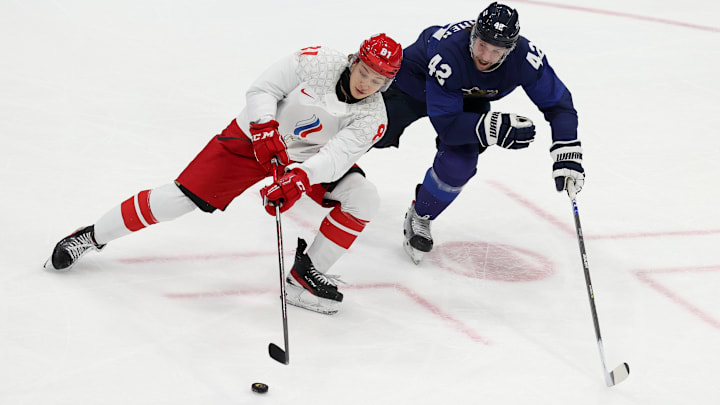With the addition of the Russian sniper Arseniy Gritsyuk out of the KHL, the New Jersey Devils knew since his draft year in 2019 that there was something special in the Krasnoyarsk native. By the time Tom Fitzgerald succeeded Ray Shero, who drafted Gritsyuk, and they watched his development overseas before signing him now at age 24 to an ELC.
Arseni Gritsyuk comes with a cap hit of $925,000 but also has performance and signing bonuses per Puck Pedia. He will be a restricted free agent at the end of 2025-2026. With this signing, it feels more like Slovak Devils winger Tomas Tatar is on his way out after an underwhelming 2024-2025 season. The idea of this shift on the wing will help get the Devils faster and more lethal in the top nine. It is only a matter of time before Arseniy Gritsyuk takes off offensively once he gets fully accustomed to North American ice. The projection for Gritsyuk to put up if at a full 82-game season is about 25 goals, 55 points at most.
The Devils' foresight in scouting and developing Gritsyuk speaks volumes about their organizational strength and forward-thinking approach. Particularly in a market like New Jersey, where patience is often required to build a competitive team, Gritsyuk’s growth in the KHL has allowed him to hone his scoring ability and physicality, traits that make him an even more valuable asset now that he’s set to make his NHL debut.
The patience exhibited by Fitzgerald and the front office has laid the foundation for a dynamic future, where players like Gritsyuk can grow into stars without being rushed into roles they aren’t ready for. This attention to detail and player development sets the Devils apart as one of the league's more methodical and well-managed franchises.
Potential Quinn Hughes Trade: Vancouver's Diminished Leverage
Now, let's shift focus to a potential franchise-changing trade for Quinn Hughes, a move that could significantly bolster the Devils’ defensive core. If the Devils are successful in acquiring Hughes, the trade could involve Dawson Mercer, Dougie Hamilton, and possibly Seamus Casey. However, Jim Rutherford's public comments about potentially moving Hughes have inadvertently undermined his negotiating position. When a GM publicly acknowledges the likelihood of trading a star player, it weakens the team's leverage, as other teams know the player’s departure is imminent. As a result, the Canucks may find themselves forced to accept a deal that falls below Hughes’ true market value.
Historically, when a team broadcasts its intention to move a star player, the trade return is often less than what could have been achieved if the deal had remained more confidential. The market for a player like Hughes should command a premium, yet the Canucks’ publicly revealed situation could significantly diminish their bargaining power.
Why Vancouver Might Settle for Less
Cap Situation: The Canucks are in a difficult cap position, and moving Hughes could open up room for a much-needed rebuild.
Hughes's Contract: With just two years remaining on his current deal and no assurances that he will re-sign with Vancouver, Rutherford may feel compelled to act quickly and extract the most value before Hughes potentially walks away for nothing in free agency.
Team Morale and Family Factor: This emotional factor could play a pivotal role in the Canucks’ decision-making, as they may prioritize a deal with the Devils to avoid having Hughes request a trade or leave in free agency.
If the Devils do manage to land Quinn Hughes, they may do so at a price lower than initially expected, thanks to the Canucks' diminished leverage. The public nature of Rutherford's comments has effectively positioned Vancouver as a team that may need to act quickly to avoid losing Hughes for nothing. While acquiring Hughes would undoubtedly strengthen the Devils’ defense, it would also be a savvy move to take advantage of a team in a weaker bargaining position.
As negotiations unfold, the Canucks will likely have to accept a deal that doesn’t meet their original expectations, and the Devils, with their deep talent pool and financial flexibility, could be poised to capitalize on this opportunity. It’s a rare chance for New Jersey to add an elite defenseman without paying the usual premium that would come with a player of Hughes’ caliber under normal circumstances.
Conclusion
Arseni Gritsyuk's signing and the potential Quinn Hughes trade represent the New Jersey Devils' commitment to long-term success and strategic player development. Gritsyuk’s addition brings speed and offensive punch to a roster already brimming with young talent, while Hughes could solidify the Devils' defensive core for years to come—perhaps at a more affordable price than initially anticipated.
The Devils, under the guidance of Tom Fitzgerald, are carefully crafting a competitive, dynamic team capable of making deep playoff runs. With players like Gritsyuk ready to contribute and the potential acquisition of a top-tier defenseman like Quinn Hughes, New Jersey’s future looks brighter than ever.
